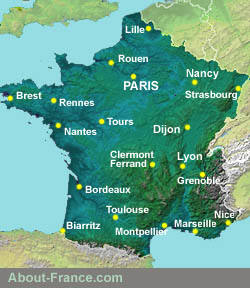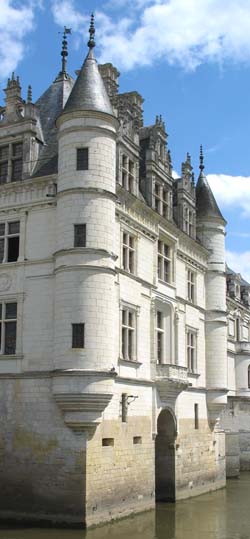Forms and uses of the infinitive in French
►
Return to main French verbs
page
Forms of the infinitive
The infinitive is the absolute and impersonal form of a verb. French verbs have just one form of the basic infinitive, ending in -er, -ir or -re. For example:Manger
=
eat or to eat
It is this form that is used to reference each verb in dictionaries.
(English, by comparison, has two forms of the infinitive, the full
infinitive with to, and the short infintive without
to.)There is also a secondary form of the infinitive, the past infinitive, formed with the infinitie of the verb être followed by the past participle of the main verb.
Avoir
mangé = to have eaten
Uses of the infinitive
The infinitive is found as a subordinate verb (following a first verb) or as a noun.1.1. The infinitive as a subordinate verb
This is the most common use of the infinitive. A number of common verbs in French, such as aimer, vouloir, détester, pouvoir, souhaiter, can be followed directly with a verb complement in the infinitive, as inJ'aime
écouter la musique - I like listening to music.
Il doit aller à Paris demain - He has to go to Paris tomorrow
Est-ce que vous savez lire le grec? - Can you read Greek ? (Do you know how to read Greek)
With certain other verbs such as demander,
chercher, commencer, insister , the verbal
complement is introduced by the proposition àIl doit aller à Paris demain - He has to go to Paris tomorrow
Est-ce que vous savez lire le grec? - Can you read Greek ? (Do you know how to read Greek)
Il
a
commencé à réviser - He's
started revising.
With other verbs, such as oublier or
refuser, the
verbal
complement is introduced by the preposition deJ'ai
oublié de fermer la fenêtre. - I
forgot to shut the window
Ils ont décidé de prendre le train du soir. -They decided to take the evening train.
Avez-vous essayé de le refaire? - Did you try to do it again?
There are also a few verbs, such as finir,
after which the verbal complement can be introduced by one of two
different prepositions, depending on the meaning.Ils ont décidé de prendre le train du soir. -They decided to take the evening train.
Avez-vous essayé de le refaire? - Did you try to do it again?
Il
a
fini de lire le livre. - He's finished reading the book.
Il a fini par lire le livre. - He ended up reading the book.
Il a fini par lire le livre. - He ended up reading the book.
1.2. The infinitive as verb in a subordinate clause
Occasionally the infinitive is used as the verb of a subordinate clause in which the subject of the subordinate clause is the object of the main clause. This structure is the equivalent, or contraction, of a relative clause.J'ai
vu
l'enfant tomber à l'eau. - I saw the child fall
in the water ( = J'ai vu l'enfant. L'enfant est
tombé à l'eau, or J'ai vu
l'enfant qui tombait à l'eau.)
Il m'a regardé faire la vaisselle. - He watched me do the washing up.
Il m'a regardé faire la vaisselle. - He watched me do the washing up.
2. The infinitive used as a noun
French differs from English, insofar as the infinitive is the only form of the verb that can be used as a noun . Unlike English, French does not use the present participle as a noun form of a verb.The infinitive is used as a noun, but not like a noun. Since it remains a verb, it cannot take an article, and cannot be qualified by an adjective. It can, on the other hand, be qualified by an adverb or followed by an object.
Voire
c'est croire. - Seeing is believing.
Etre ou ne pas être. - To be or not to be.
Bien manger est bon pour la santé. - Eating well is good for one's health.
Trop boire d'alcool est mauvais pour la santé. - Drinking too much alcohol is bad for one's health.
Etre ou ne pas être. - To be or not to be.
Bien manger est bon pour la santé. - Eating well is good for one's health.
Trop boire d'alcool est mauvais pour la santé. - Drinking too much alcohol is bad for one's health.
Exceptions
In just a few cases, verbal infinitives have taken on the quality of nouns, and can thus be preceeded by an article, and be the subject or object of a sentence.Le
savoir faire. - Skills, or knowing how to do things.
Le franc parler. - Speaking frankly, straight talk.
Son franc parler est parfois un avantage. - His frank way of speaking is sometimes an advantage.
But for most verbs, the true noun form is different: descendre
/ une descente, conduire / la conduite, commencer / le
commencement, naître / la naissance.
Le franc parler. - Speaking frankly, straight talk.
Son franc parler est parfois un avantage. - His frank way of speaking is sometimes an advantage.
| Return to French grammar pages : index | Full site index | Essential French words and phrases for travellers |




